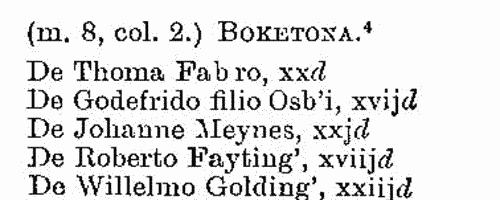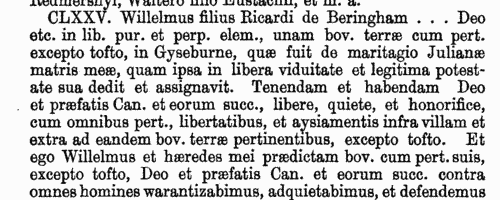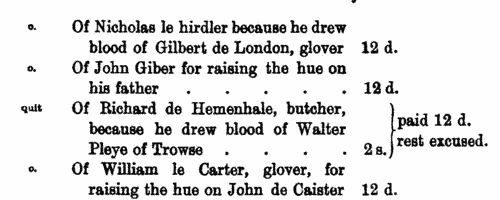Sartrin Surname Ancestry ResultsOur indexes 1000-1999 include entries for the spelling 'sartrin'. In the period you have requested, we have the following 4 records (displaying 1 to 4): Buy all | | | Get all 4 records to view, to save and print for £16.00 |
These sample scans are from the original record. You will get scans of the full pages or articles where the surname you searched for has been found. Your web browser may prevent the sample windows from opening; in this case please change your browser settings to allow pop-up windows from this site. Inhabitants of Yorkshire
(1297)
Taxation roll of the lay (non-clergy) inhabitants of Yorkshire from the 25th year of the reign of king Edward I. LatinSARTRIN. Cost: £6.00.  | Sample scan, click to enlarge

| Guisborough Cartulary
(1119-1300)
The Augustinian (black canons) priory of the Blessed Virgin Mary at Guisborough (Gyseburne) near Middlesbrough in north Yorkshire, was founded about 1119 by Robert de Brus. The 1100 or so grants of land (mostly in Cleveland) made to the priory from then well into the 13th century were copied into a cartulary or chartulary which survives as Cottonian Manuscript Cleopatra d ii (British Library). This was edited by W. Brown and published by the Surtees Society from 1889. This first part contains the charters from folios 1 to 233, items I to DXCIII. The texts have been stripped of repetitious legal formulae, retaining the details of the grantors, the property, and the witnesses: so the individuals named are mainly local landowners and tenants, canons, servants and wellwishers of the monastery. The charters before 1250 are often undated.SARTRIN. Cost: £4.00.  | Sample scan, click to enlarge

| Inhabitants of Norwich
(1288-1391)
Among the documents preserved in the record room of the Guildhall in the city of Norwich were 13 rolls connected with the leet courts in the city during the 13th and 14th centuries while the frankpledge system on which they were based was still in full operation. William Hudson, vicar of St Peter Permountergate in the city, prepared a copy of the earliest of these, from 1288, and extracts from the leet rolls of 1289, 1290, 1291, 1293, 1296, 1300, c1307, 1313, 1375 and 1391, and from an account of amercements in 1364, a tithing roll of Mancroft leet of 1311, and inquisitions before the bailiffs in 1350, and these were published by the Selden Society in 1892, with an English translation facing the extended Latin text. In 1288 there were four leets in the city - Conesford (North Conesford, South Conesford and Berstrete subleets), Manecroft (St Stephen, St Peter de Manecroft), Wymer or Westwyk (St Giles, St Gregory, St Andrew and St George), and Over the Water (St Michael and St Clement. Each leet had separate courts and separate records within the rolls. Hudson lists the main categories of items recorded as: murder, violent death, nuisances, weights, unwholesome food, larceny, assaults, hue and cry, being out of tithing, non-attendance at leet, purprestures, forestalling, unlawful trading, craft gilds, fraudulent work, and impleading in the Court Christian. SARTRIN. Cost: £4.00.  | Sample scan, click to enlarge

| Tradesmen of York
(1272-1558)
No man or woman could trade in the city of York without having obtained 'freedom' of the city.Their names were recorded on the 'Freemen's Roll', or Register of the Freemen of the City of York, which contains about 19,900 names for this period. A list of names was prepared for each year, the year being here reckoned as starting at Michaelmas (29 September) until 1373, and thence at Candlemas (2 February). Each annual list starts with the name of the mayor and the camerarii or chamberlains. The chamberlains were freemen charged with the duty of receiving the fees of the new freemen; of seeing that only freemen traded in the city; and of preparing this roll, which was compiled from the names on their own account books from the receipts for the fees. There are three groups of freemen: those who obtained freedom after serving out an apprenticeship to a freeman; the children of freemen; and those who claimed freedom by 'redemption', i. e. by purchase or gift from the Mayor and Court of Aldermen.
SARTRIN. Cost: £2.00.  | Sample scan, click to enlarge

|
Research your ancestry, family history, genealogy and one-name study by direct access to original records and archives indexed by surname.
|






